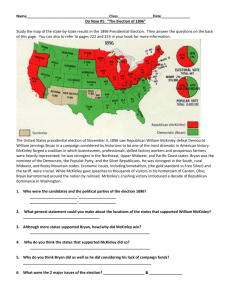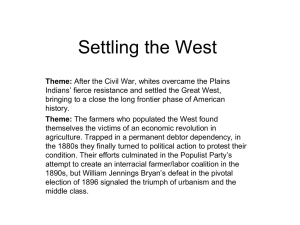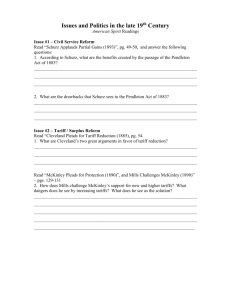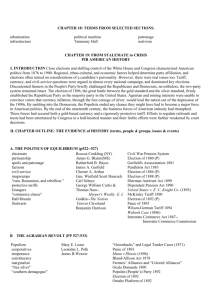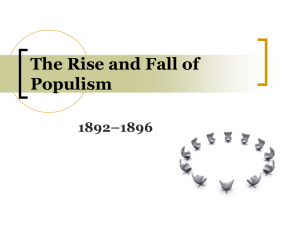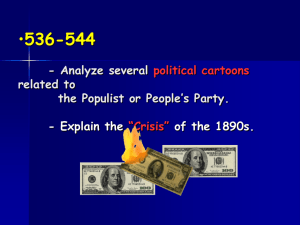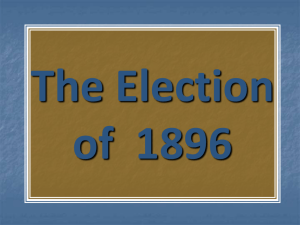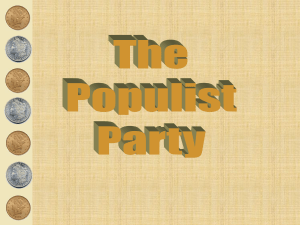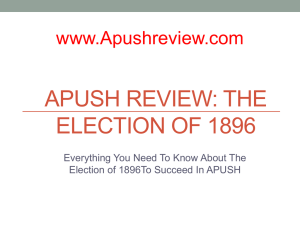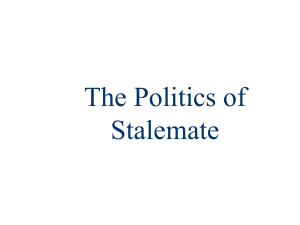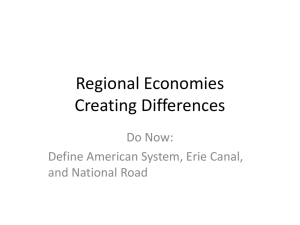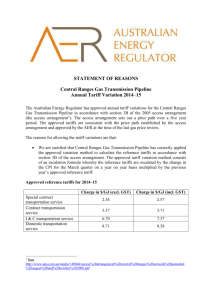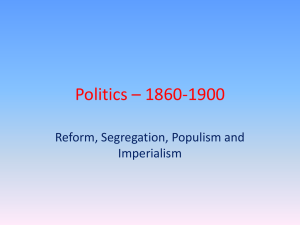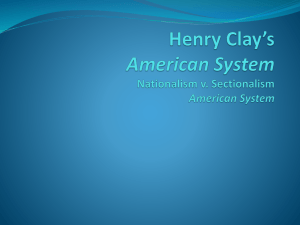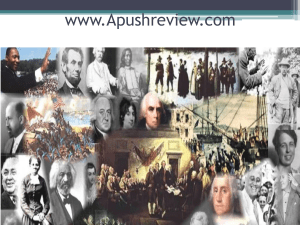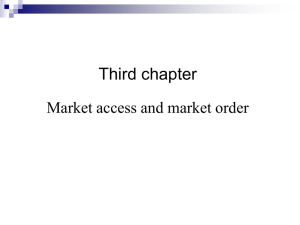Chapter 21
advertisement
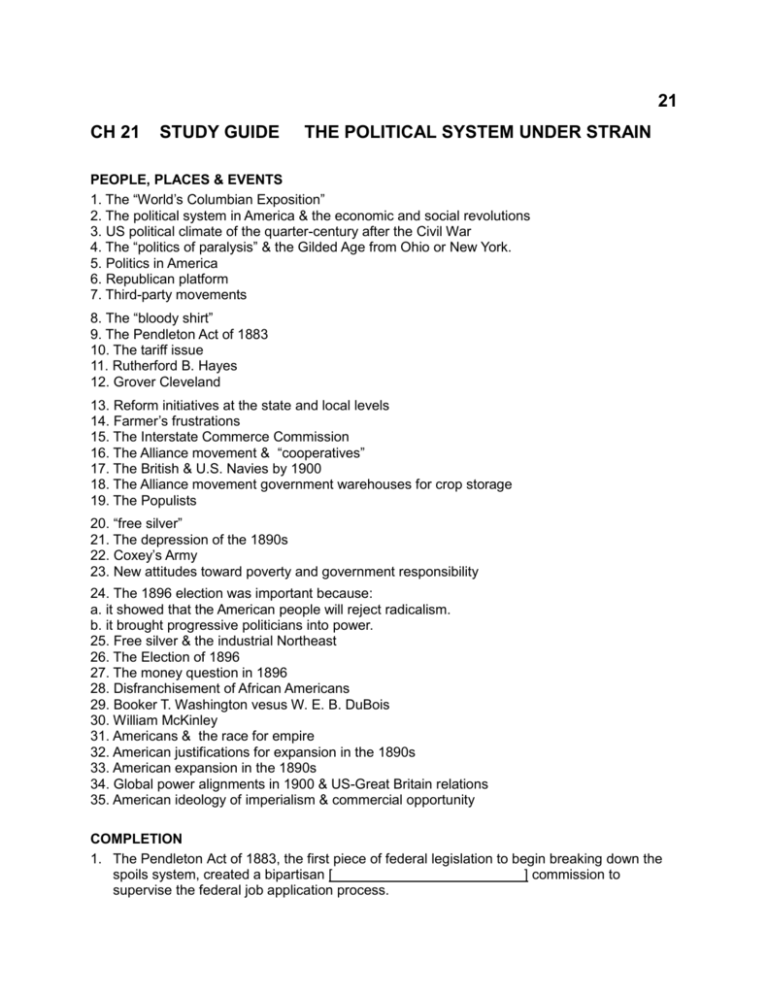
21 CH 21 STUDY GUIDE THE POLITICAL SYSTEM UNDER STRAIN PEOPLE, PLACES & EVENTS 1. The “World’s Columbian Exposition” 2. The political system in America & the economic and social revolutions 3. US political climate of the quarter-century after the Civil War 4. The “politics of paralysis” & the Gilded Age from Ohio or New York. 5. Politics in America 6. Republican platform 7. Third-party movements 8. The “bloody shirt” 9. The Pendleton Act of 1883 10. The tariff issue 11. Rutherford B. Hayes 12. Grover Cleveland 13. Reform initiatives at the state and local levels 14. Farmer’s frustrations 15. The Interstate Commerce Commission 16. The Alliance movement & “cooperatives” 17. The British & U.S. Navies by 1900 18. The Alliance movement government warehouses for crop storage 19. The Populists 20. “free silver” 21. The depression of the 1890s 22. Coxey’s Army 23. New attitudes toward poverty and government responsibility 24. The 1896 election was important because: a. it showed that the American people will reject radicalism. b. it brought progressive politicians into power. 25. Free silver & the industrial Northeast 26. The Election of 1896 27. The money question in 1896 28. Disfranchisement of African Americans 29. Booker T. Washington vesus W. E. B. DuBois 30. William McKinley 31. Americans & the race for empire 32. American justifications for expansion in the 1890s 33. American expansion in the 1890s 34. Global power alignments in 1900 & US-Great Britain relations 35. American ideology of imperialism & commercial opportunity COMPLETION 1. The Pendleton Act of 1883, the first piece of federal legislation to begin breaking down the spoils system, created a bipartisan [ ] commission to supervise the federal job application process. Chapter 21: The Political System Under Strain 2. In the South, poor farmers suffered; at the heart of their problem was [ .] 3. After the grange movement lost ground, another wave of farm protest organizations arose in the later 1880s, collectively known as the [ ] movement. 4. William Jennings Bryan garnered more votes than any previous candidate in American history, but still lost the critical presidential election in the year [ ] to William McKinley. 5. The “talented tenth” should speak out in protest against Jim Crow practices, argued the scholar [ ]. IDENTIFICATION Students should be able to describe the following key terms, concepts, individuals, and places, and explain their significance: Terms and Concepts Populism Mugwumps Pendleton Act McKinley Tariff Bland-Allison Act Patrons of Husbandry Granger laws Ocala Demands Depression of 1893 Free silver Niagara Movement White Man’s Burden Imperialism crop-lien system Anti-Saloon League protective tariff bimetallism Sherman Anti-Trust Act Interstate Commerce Commission Southern Alliance Populist platform, 1892 anarchism disfranchisement Social Darwinism Open Door Anti-imperialists Individuals and Places Thomas E. Watson Charles W. Macune Ignatius Donnelly Marcus Hanna Booker T. Washington W.E.B. DuBois Alfred Thayer Mahan James Garfield Mary Elizabeth Lease Jacob Coxey William Jennings Bryan Tuskegee Institute Admiral George Dewey Isthmus of Panama MAP IDENTIFICATIONS Students have been given the following map exercise: On the map on the following page, label or shade in the following places. In a sentence, note their significance to the chapter. 1. States whose electoral votes went for William McKinley in 1896 2. States whose electoral votes went for William Jennings Bryan in 1896 3. States most urbanized 4. States least urbanized 1. . 186 Chapter 21: The Political System Under Strain 1. CRITICAL THINKING EVALUATING EVIDENCE (MAPS) 1. The election of 1896 marked a dramatic realignment in American politics. What does the election map on page 687indicate about the geographic nature of the new alignment? What does geography tell us about the Republican and Democratic constituencies? 2. Although Democrat William Jennings Bryan and Republican William McKinley were less than a million popular votes apart in the election of 1896, McKinley received nearly twice as many electoral votes. Why? EVALUATING EVIDENCE (ILLUSTRATIONS AND CHARTS) 1. Compare the men “waiting for bread” (in the drawing on page 685) during the depression of 1893. Who might they be? How can you tell? The drawing, by Charles Dana Gibson, is not particularly characteristic of his work. Consult an encyclopedia and explain why. 2. Why is Bryan depicted as a snake swallowing itself in the political cartoon on page 686? What is its message? 3. What kind of class is being taught at the Tuskegee Institute, pictured on page 683? Why is such a class being taught in a school whose principal mission is to train students in agriculture and manual trades? How are the students segregated? Why? CRITICAL ANALYSIS Students have been asked to read carefully the following excerpt from the text and then answer the questions that follow. 187 Chapter 21: The Political System Under Strain As the campaign of 1892 heated up, white Populists found themselves barred from their churches by hostile fellow citizens, denied credit at local stores, driven from their homes. Citizens of both races nevertheless worked eagerly for Watson. One young black preacher, the Reverend H. S. Doyle, made over 60 speeches on the candidate’s behalf. When a lynch mob threatened Doyle, Watson gave him haven on his own lands and protected him with some 2,000 Populists. They arrived on “buggies and horses foaming and tired with travel.” “We are determined,” said Watson, “in this free country that the humblest white or black man that wants to talk our doctrine shall do it, and the man doesn’t live who shall touch a hair of his head, without fighting every man in the people’s party.” Still, upright intentions could not outweigh fraud and violence. As many as 15 blacks died in the Democratic campaign of intimidation. Whiskey was dispensed liberally to persuade citizens to vote Democratic. Blacks were trucked in from across the South Carolina line to vote. Many Democrats stuffed more than one ballot box, and cash bribes routinely changed hands. After winning through such a convincing show of force, Watson’s opponents expected that their adversary had learned his lesson—was so badly beaten that he would have to be laid out like a corpse at a funeral. Watson was having none of it. “We decided not to die,” he announced, on behalf of his Party. “We unanimously decided to postpone the funeral.” PRIMARY SOURCE: “TARIFF ON THE BRAIN”* The tariff was a major source of controversy in the late nineteenth century. Industrialists favored it, claiming that it protected American business from foreign competition and kept workers’ wages up. Advocates of free trade, many farmers among them, opposed it with counterclaims that American industry no longer needed protection and consumers no longer needed to pay tariff-inflated prices. The following song appeared in a Populist newspaper in the 1890s. Come all you honest people, Whoever you may be, And help the honest workingmen Resist monopoly. ‘Tis headed by the brokers— They deal in bonds and stocks; They cite us to the tariff While they’re getting in their knocks. CHORUS: Tariff on the brain! Tariff on the brain! Look out for politicians Who have tariff on the brain. The goldbugs, knowing Grover To their scheming would agree, They put him in the White House, Their agent there to be. They robbed us of our silver *From a Populist newspaper, 1890s, reprinted in Kansas Quarterly 1 (Fall, 1969). 188 Chapter 21: The Political System Under Strain And grabbed up all our gold— They cite us to the sheriff And leave us in the cold. CHORUS They’ve a scheme to throttle labor And monopolize the land, To make of us a servile herd While they are rich and grand. Their schemes cause want and hunger, And they may be foiled perhaps; Or will our fair Columbia By their greediness collapse. 189
